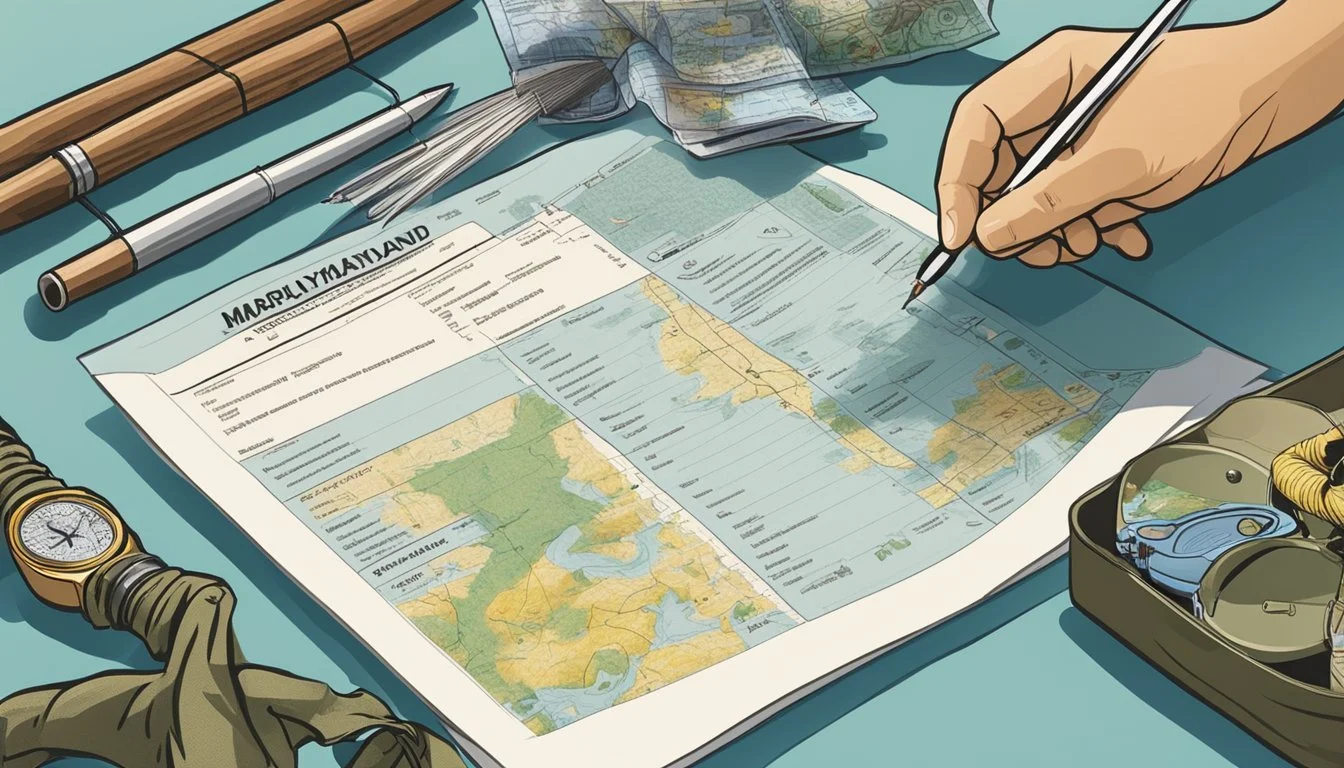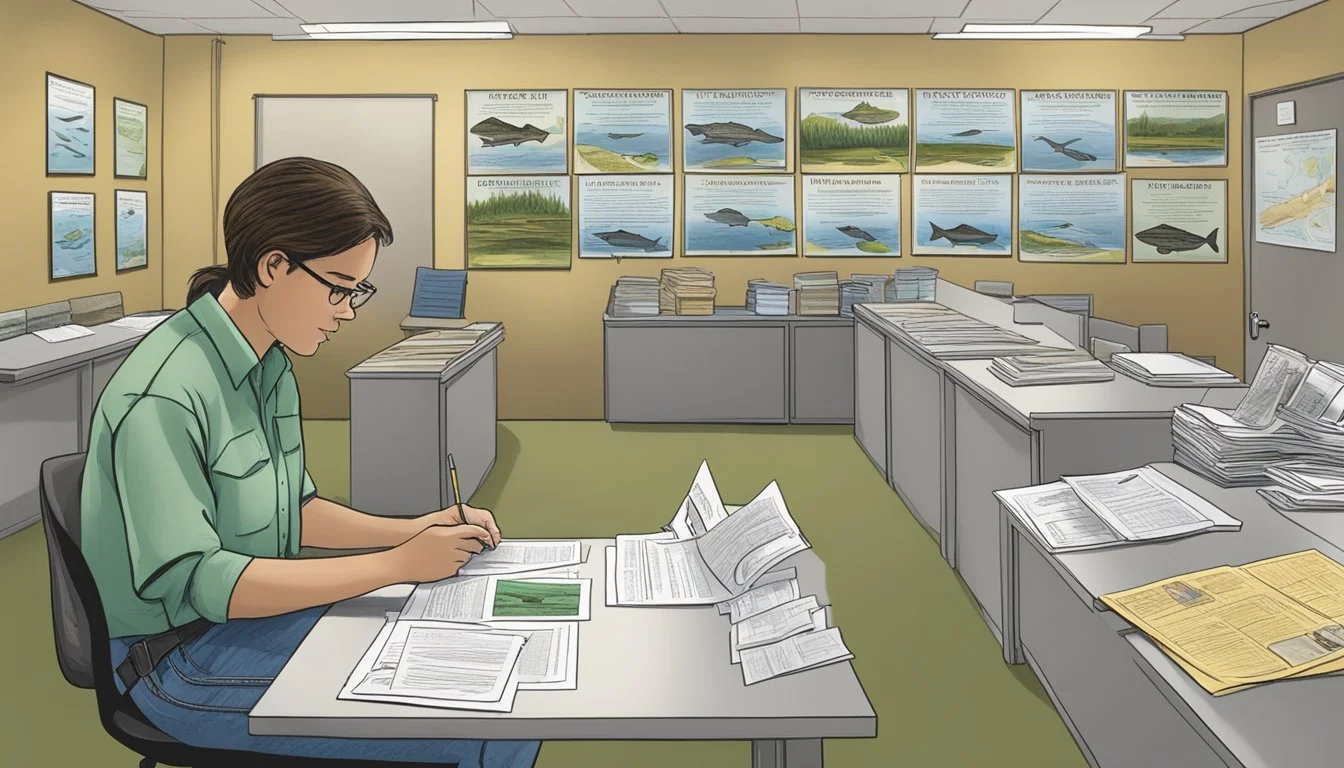How to Get a Maryland Freshwater Fishing License
Your Step-by-Step Guide
In Maryland, obtaining a freshwater fishing license is a straightforward process essential for anglers wishing to enjoy the many fishing opportunities the state has to offer. Freshwater fishing in Maryland is governed by regulations that ensure fish (What wine goes well with fish?) populations thrive and ecosystems remain balanced. Anglers are required to have a valid license to fish in non-tidal waters, which are home to a variety of species such as bass, trout, and catfish.
Licenses are easily accessible, catering to different needs and time frames: there are annual licenses as well as shorter-term options for those visiting or planning only a few fishing expeditions per year. They can be purchased online through the Maryland Department of Natural Resources website, or in person at any branch of the Maryland DNR Service Center. This enables both residents and non-residents to comply with state laws and contribute to the conservation efforts that maintain Maryland's freshwater fisheries.
In addition to being necessary for the law, the purchase of a Maryland fishing license contributes to conservation and natural resource management efforts. The revenue generated is reinvested into the maintenance of the state's aquatic life and habitats, ensuring the preservation of Maryland's natural heritage for future generations of anglers.
Understanding Maryland Fishing Licenses
When pursuing fishing activities in Maryland, anglers must understand the different types of licenses available, the distinction between freshwater and saltwater licenses, and the relevant regulations and exemptions. This ensures compliance with state laws and contributes to the conservation of Maryland's aquatic ecosystems.
Types of Maryland Fishing Licenses
Maryland offers a variety of fishing licenses to accommodate both recreational and commercial fishermen. Recreational licenses include:
Annual Non-Tidal/Freshwater License: Allows fishing in non-tidal waters for species found in Maryland's freshwater bodies.
Chesapeake Bay & Coastal Sport Fishing License: Required for recreational fishing in the Bay and its tributaries, as well as the Atlantic Ocean and coastal bays.
Commercial licenses, on the other hand, are required for individuals who fish for profit and include different permits and authorizations governed by specific state regulations.
Freshwater Vs. Saltwater Licenses
In Maryland, the key distinction between freshwater and saltwater licenses lies in the type of water body an angler intends to fish:
Freshwater (Non-Tidal) License: Necessary for fishing in non-tidal streams, rivers, and lakes.
Saltwater (Tidal) License: Mandatory for fishing in tidal waters, including the Chesapeake Bay and its tributaries, as well as Maryland's portion of the Atlantic Ocean and coastal bays.
Anglers should ensure they procure the appropriate license corresponding to their chosen fishing location.
Regulations and Exemptions
Maryland fishing licenses come with specific regulations to maintain sustainable fishing practices. These include size and bag limits, seasonal restrictions, and gear regulations. Certain groups may be exempt from these licensing requirements:
Individuals under 16 years of age.
Maryland residents fishing on their own private property.
Understanding these regulations and exemptions is crucial for anglers to avoid penalties and contribute to the health of Maryland's fishing resources.
Eligibility and Requirements
Acquiring a Maryland freshwater fishing license requires meeting specific eligibility criteria and understanding the various rules that apply to different groups such as residents, non-residents, and individuals eligible for special licenses.
Resident and Non-Resident Criteria
Maryland defines residents as individuals who possess a valid Maryland driver's license or a state-issued ID card as proof of residency. These individuals are eligible for resident fishing license rates. Non-residents, being those who do not have a Maryland driver's license or state-issued ID, can still obtain a fishing license but at a different fee structure.
Special Licenses for Veterans and Disabled Anglers
Maryland offers special fishing license privileges to veterans and disabled veterans, including those who are blind or former prisoners of war. They must provide appropriate documentation confirming their status to receive these benefits, which may include discounted or free licensing options.
Age-Related Exemptions and Requirements
In Maryland, anglers 15 years of age and younger are exempt from needing a fishing license. Individuals 16 years and older must obtain a license. Senior residents—those 65 years of age or older within the calendar year—are eligible for the Resident Senior Consolidated License, allowing them to fish in both non-tidal and tidal waters.
Please note that all information is subject to change, and it's important to check with the Maryland Department of Natural Resources for the most current regulations and requirements.
How to Apply for a Maryland Freshwater License
Applying for a Maryland freshwater fishing license is straightforward and can be accomplished through various methods. These include using the online COMPASS portal, submitting an application by mail, or opting for in-person services at authorized locations.
Online Application via COMPASS Portal
Individuals looking to apply for a Maryland freshwater fishing license can complete the process online through the COMPASS portal. Applicants may register without creating an account or logging in. The following steps should be followed:
Visit the official COMPASS portal website.
Complete the required registration form.
Submit the application and pay the applicable fee online.
The online service provides a convenient way to obtain a license any time, and users receive their license immediately after the transaction is completed.
Application by Mail
For those preferring to apply by mail:
Obtain the necessary application form from the Maryland Department of Natural Resources website or by contacting a service center.
Fill out the form with the correct information.
Include the correct payment amount by check or money order.
Mail the completed form and payment.
When applying by mail, applicants should allow adequate time for the application to be received and processed.
In-Person Application Methods
Individuals may also apply in person by visiting one of Maryland's Department of Natural Resources Service Centers or a licensed agent.
Visit a local service center or a licensed agent's location.
Provide the necessary personal details and payment for processing.
In-person applications offer the benefit of direct assistance and immediate issuance of the license.
Additional Permits and Registrations
In Maryland, certain fishing activities require additional permits and registrations beyond the basic freshwater fishing license. This ensures anglers comply with specific conservation efforts and manage the fishing resources effectively.
Trout Stamp and Chesapeake Bay & Coastal Sport Fishing License
Anglers targeting trout or fishing in the Chesapeake Bay and its tidal waters require more than just the basic freshwater fishing license. They must also obtain a Trout Stamp, which costs $5 for residents. For those intending to fish in the Chesapeake Bay or coastal waters, a Resident Chesapeake Bay and Coastal Sport Fishing License is necessary and runs at $15 annually. This license also covers fishing in the Atlantic Ocean coast and its coastal bays and tributaries.
Charter Boat and Commercial Fishing Licenses
For operators of charter boats, a specific license must be secured to allow passengers to fish without their individual licenses. Similarly, commercial fishermen must obtain a Commercial Tidal Fish License to partake in harvesting fish for sale. This ensures proper reporting of catches and adherence to regional fishing regulations to support sustainable industry practices.
Potomac River Fisheries Commission Recreational Fishing License
Those who fish on the Potomac River cannot rely solely on the Maryland fishing license. Instead, they need a Potomac River Fisheries Commission Recreational Fishing License. The PRFC manages this waterway jointly with Virginia, and its regulations differ slightly from Maryland’s, requiring its separate license to lawfully fish in these waters.
Costs and Duration of Licenses
When looking to fish in Maryland's freshwater, anglers need to be aware of the specific fees associated with various licenses and the length of time each license remains valid before needing renewal.
License Fees
Resident Licenses:
Resident Nontidal (Freshwater) Sport Fishing License: $20.50
Resident 7-Day Nontidal Sport Fishing License: $6.00
Resident Trout Stamp: $5.00
Resident Senior Consolidated Sport Fishing License: $5.00 (includes tidal, nontidal, and trout stamp for those 65 years or older)
Resident Chesapeake Bay and Coastal Sport Fishing License: $15.00
Non-Resident Licenses:
Non-Resident Nontidal (Freshwater) Sport Fishing License: $30.50
Non-Resident Trout Stamp: (Fee not provided in the search results)
Non-Resident Chesapeake Bay and Coastal Sport Fishing License: $22.50
Boat Licenses:
Chesapeake Bay and Coastal Sport Boat License: (Fee not provided in the search results)
Anglers must maintain caution to choose the appropriate license that suits their fishing plans, whether it's a short-term visit or a full season of angling activities.
Validity Period and Renewal Options
Licenses for fishing in Maryland generally have an annual duration, requiring renewal upon expiry. The Resident Senior Consolidated Sport Fishing License has a one-year validity. Short-term licenses are also available for those planning brief fishing trips: residents can opt for a 7-day license, while non-residents have the option for both 7-day and 3-day licenses.
Annual Licenses: Expiry 365 days from the date of purchase
Short-term Licenses:
Resident 7-Day License: Valid for 7 consecutive days
Non-Resident Options: 7-day and 3-day licenses available
Renewals can be processed similar to initial purchases, with enforcement of the no-tolerance policy regarding fishing without an up-to-date license. It's important for anglers to track the expiration dates of their licenses to ensure they are legally compliant while enjoying Maryland's waterways.
Fishing Regulations and Conservation
Maryland's fishing regulations are designed to manage fish populations effectively, ensuring sustainability and environmental balance. They are in place to help maintain the health of the state's aquatic ecosystems and provide a high-quality fishing experience.
Catch Limits and Size Regulations
Maryland enforces specific catch limits and size regulations to promote healthy fish populations and ecosystems. For freshwater fishing, these limits vary by species. Under the Natural Resources Article §4-745 Annotated Code of Maryland, anglers must adhere to the established daily creel and possession limits. Regulations also dictate minimum sizes to ensure that fish have reached maturity and have had an opportunity to reproduce before being harvested.
Species Minimum Size Daily Creel Limit Trout Varies by area Varies by area Largemouth Bass 12 inches 5 Smallmouth Bass 12 inches 5 Striped Bass 18 inches 2
Anglers should consult the latest Maryland Fishing Regulations Guide for complete and current limits and regulations.
Conservation Practices and Catch and Release
Conservation practices, including catch and release, are critical for the continuity of fisheries and their habitats. Fishers are encouraged to employ catch and release methods, especially when targeting species that are out of season or do not meet size requirements. By releasing young and undersized fish, anglers contribute to the ongoing health and abundance of fish stocks.
Moreover, catch and release should be done using techniques that minimize harm to the fish, such as using barbless hooks and handling fish with wet hands to prevent damage to their protective slime coating. Maryland promotes these practices to aid in the preservation of its natural resources for future generations of anglers.
Free Fishing Days and Recreational Opportunities
Maryland offers select days when individuals can fish without a license, providing a great opportunity for residents and visitors to enjoy the state's freshwaters. These free fishing days are specific to freshwater fishing, recreational crabbing, and fishing on private property.
Annual Free Fishing Days
Maryland's Department of Natural Resources designates certain days as Free Fishing Days. On these days, anglers can fish without a fishing license in the state's freshwater bodies. The free fishing days typically fall on the first two Saturdays in June and on July 4th. This initiative intends to encourage more people to experience fishing and to celebrate the rich aquatic life of Maryland.
Recreational Crabbing and Private Property Fishing
Individuals interested in recreational crabbing or fishing on private property also benefit from relaxed regulations. For recreational crabbing, one does not need a license on free fishing days. Regarding private property, individuals under the age of 16 do not require a license to fish, promoting youth participation in the sport. Property owners with waterfront land may fish on their property without a license, adhering to the state's natural resources guidelines.
Fishing in Maryland's Diverse Waters
Maryland offers a rich variety of fishing experiences from the brackish Chesapeake Bay and its tributaries to the clear freshwater streams and lakes across the state, encompassing both tidal and nontidal fisheries.
Chesapeake Bay and Coastal Bays Fishing
The Chesapeake Bay is renowned for its brackish water fishing, where anglers often target the celebrated Striped Bass, also known locally as Rockfish. The Bay's vast network of tributaries provides ample opportunity for both boat and shore anglers. Maryland's coastal bays, adjacent to the Atlantic Ocean along the Atlantic coast, offer fishing experiences in saltier waters with a chance to catch species like flounder and bluefish.
Freshwater Fishing in Streams, Rivers, and Lakes
For freshwater enthusiasts, Maryland's interior hosts a network of streams, rivers, and lakes teeming with a variety of species. Anglers can find largemouth and smallmouth bass, trout, and catfish, among others. These freshwater areas include both nontidal and tidal waters, expanding the scope of potential fishing activities and environments.
Tidal and Nontidal Fisheries
Maryland's waters are split into tidal and nontidal fisheries, with specific regulations governing each. Tidal waters refer to areas where the water level is influenced by the tide, including parts of the Chesapeake Bay and the coastal bays, as well as some areas where tributaries meet the ocean. Conversely, nontidal refers to inland waters such as lakes and streams where the tide has no effect. Regulations may differ between these areas, so anglers should be aware of the rules that apply to their chosen fishing location.







